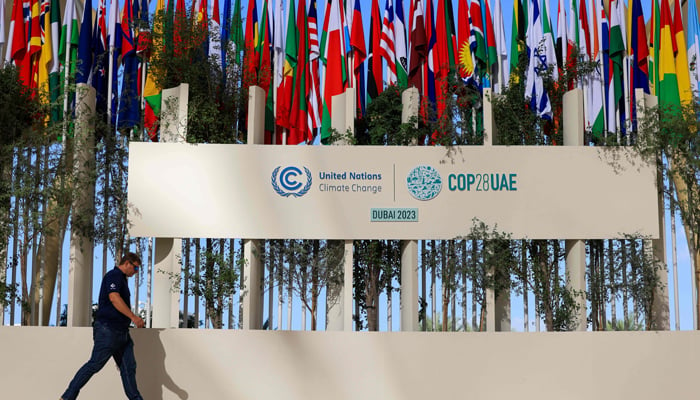The stakes at COP28
COP28 is under way as world leaders and delegates from various industries assemble in Dubai for the year’s biggest climate event which run till December 12. The agenda is clear: the stats speak for themselves and underscore the importance of coming up with a binding agreement to make the earth a safe place to live in. That the year 2023 is all set to become the warmest year in history with early fires in Australia (which had burnt 4,500 acres by November 26), heatwaves in India, and floods in Sudan points to the urgency needed to rein in production activities that are evidently anti-environment.
COP28 will also allow rich countries to share the progress made regarding the much-appreciated Loss and Damage Fund, which was called an achievement of COP27 held in Egypt last year. Many countries have not shown any willingness to honour their commitments, leaving developing countries in a fix.
But the developed world has reneged on more than one promise. During COP15 (climate conferences dedicated to biodiversity) held in Canada, countries decided to set up the Global Biodiversity Framework Fund to “mobilize substantial financial resources to protect nature and the planet.” No substantial work has been done in this regard so far. If things continue to remain as is, conferences like these will lose their value. Since October 7, we have been watching how the violations made by the developed world and its allies are conveniently ignored. Israel has been given a free hand to use white phosphorus – which should be seen as a dangerous weapon if not to save the children in the war-torn Gaza than at least to protect the environment – without any repercussions. The complete destruction of the Gaza Strip’s green fertile land also shows that developed nations have the habit of doing things as they please. For developing countries like Pakistan which rely on foreign funding to rebuild the destruction caused by natural catastrophes, this should be an eye-opener.
While such conferences are extremely important for our shared future – is there any doubt that a healthy planet is profitable for all countries? – it is important for the developing world to hold rich nations accountable and ask them why they have not done anything about rebuilding countries that have been massively affected by climate-induced disasters. It must be known that countries which have been worst affected by climate change have negligible contributions towards global carbon emissions. We have two days left, and all we hope is to see a climate conference where rich nations acknowledge the devastating effects of their production activities and war policies and make an unbreakable pledge to help nations rebuild themselves.
-
 Eric Dane's Girlfriend Janell Shirtcliff Pays Him Emotional Tribute After ALS Death
Eric Dane's Girlfriend Janell Shirtcliff Pays Him Emotional Tribute After ALS Death -
 King Charles Faces ‘stuff Of The Nightmares’ Over Jarring Issue
King Charles Faces ‘stuff Of The Nightmares’ Over Jarring Issue -
 Sarah Ferguson Has ‘no Remorse’ Over Jeffrey Epstein Friendship
Sarah Ferguson Has ‘no Remorse’ Over Jeffrey Epstein Friendship -
 A$AP Rocky Throws Rihanna Surprise Birthday Dinner On Turning 38
A$AP Rocky Throws Rihanna Surprise Birthday Dinner On Turning 38 -
 Andrew Jokes In Hold As BAFTA Welcomes Prince William
Andrew Jokes In Hold As BAFTA Welcomes Prince William -
 Sam Levinson Donates $27K To Eric Dane Family Fund After Actor’s Death
Sam Levinson Donates $27K To Eric Dane Family Fund After Actor’s Death -
 Savannah Guthrie Mother Case: Police Block Activist Mom Group Efforts To Search For Missing Nancy Over Permission Row
Savannah Guthrie Mother Case: Police Block Activist Mom Group Efforts To Search For Missing Nancy Over Permission Row -
 Dove Cameron Calls '56 Days' Casting 'Hollywood Fever Dream'
Dove Cameron Calls '56 Days' Casting 'Hollywood Fever Dream' -
 Prince William, Kate Middleton ‘carrying Weight’ Of Reputation In Epstein Scandal
Prince William, Kate Middleton ‘carrying Weight’ Of Reputation In Epstein Scandal -
 Timothée Chalamet Compares 'Dune: Part Three' With Iconic Films 'Interstellar', 'The Dark Knight' & 'Apocalypse Now'
Timothée Chalamet Compares 'Dune: Part Three' With Iconic Films 'Interstellar', 'The Dark Knight' & 'Apocalypse Now' -
 Little Mix Star Leigh-Anne Pinnock Talks About Protecting Her Children From Social Media
Little Mix Star Leigh-Anne Pinnock Talks About Protecting Her Children From Social Media -
 Ghislaine Maxwell Is ‘fall Guy’ For Jeffrey Epstein, Claims Brother
Ghislaine Maxwell Is ‘fall Guy’ For Jeffrey Epstein, Claims Brother -
 Timothee Chalamet Rejects Fame Linked To Kardashian Reality TV World While Dating Kylie Jenner
Timothee Chalamet Rejects Fame Linked To Kardashian Reality TV World While Dating Kylie Jenner -
 Sarah Chalke Recalls Backlash To 'Roseanne' Casting
Sarah Chalke Recalls Backlash To 'Roseanne' Casting -
 Pamela Anderson, David Hasselhoff's Return To Reimagined Version Of 'Baywatch' Confirmed By Star
Pamela Anderson, David Hasselhoff's Return To Reimagined Version Of 'Baywatch' Confirmed By Star -
 Willie Colón, Salsa Legend, Dies At 75
Willie Colón, Salsa Legend, Dies At 75




